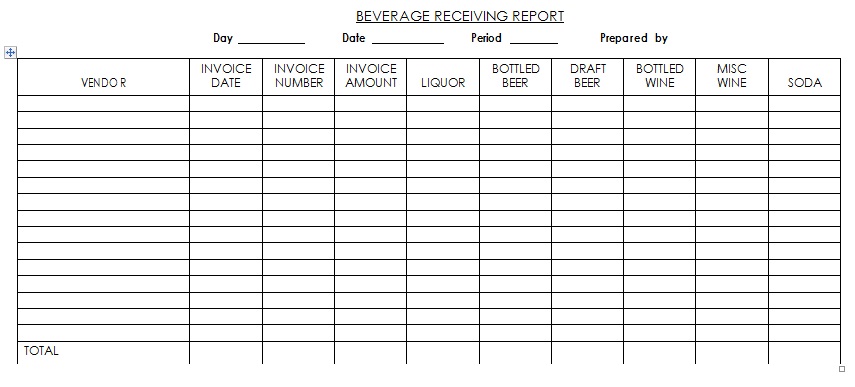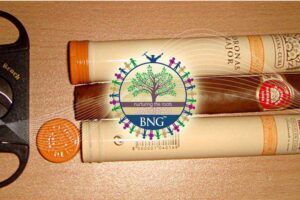
Beverage Receiving Procedure
Beverage Receiving Procedure for Hotels and Restaurants
Hotels and restaurants utilize the operational and Clerical Beverage Receiving Procedure to ensure full and proper control of all Beverage product during the receiving process, to outline all required paperwork and approvals associated with beverage receiving and to aid in controlling beverage cost.
Beverage Receiving Procedure – Operational:
Beverage Receiving Procedure : RECEIVING METHODS
1. Beverage products will be received only by approved, trained individuals.
These individuals are to be designated by the Director of Food and Beverage and will normally include the F&B Beverage Manager, Assistant Manager and Beverage Storeroom Attendant.
2. As with any ordering/receiving process, care must be taken to ensure that the ordering responsibility is separated from the receiving responsibility. These duties must be assigned to two different individuals.
3. The designated Beverage Receiver must be present from the time the product is unloaded until all items are secured and properly stored in the Beverage Storeroom
4. The Beverage Receiver will check all items for correct quantity, brand and size. The receiver should also check for any broken or leaking bottles.
5. Any product that is incorrect or broken must be returned for credit immediately. If the delivery person cannot issue a credit memo, he or she
should sign the hotel copy of the invoice indicating an damage, shortages, etc. The Sales Person or Customer Service should then be contacted for immediate issuance of a credit memo.
6. All Beverage products must be properly stored immediately after receipt. The following general procedures should be used in the proper storage of Beverage product:
a. Liquor/Spirits
All liquor/spirits is to be removed from cases and stored upright on shelving. Bottles and brands should be arranged in the same order as the Perpetual Beverage Inventory to facilitate inventory control, issuance and ordering. Exceptions to this procedure would be liquor/spirits purchased in large quantities for use in the liquor dispensing system or in banquets. Bulk product may be stored in cases (off the floor) until needed for use.
b. Wine
All wines should be stored on shelves on their side to keep corks. moist. Where practical, white and sparking wines should be stored under refrigeration. Wines should be stored by bin number to facilitate inventory control, issuance and ordering. Exceptions to this procedure are “Jug” wines purchased in bulk for use in the wine dispensing system and in banquets. Bulk product may be stored in cases (off the floor) until needed for use.
c. Beer
Beer should be stored under refrigeration and on Health Department approved “dunnage” racks. Wooden pallets are not permitted. Bottled beer should be arranged by brand in the same order as the perpetual inventory to facilitate inventory control, issuance and ordering.
7. Order Pick-Up
In some states, alcoholic beverages must be picked up at a distributor or Store by a hotel employee. This employee must be a manager, and must be designated by the Director of Food and Beverage.
All other Operational Beverage Receiving Procedures should be followed when picking up orders, providing they allow full compliance with all state and local regulations.
8. Order Delivery by Third Party
In some cases where customer pick-up of alcoholic beverages is required, third party delivery services can be contracted for pick-up and delivery. It is essential that any service used be licensed and bonded, and photocopies of same should be retained on file by the controller. All other applicable Operational Receiving Procedures should be followed when using a delivery service.
9. The Director of Food and Beverage and General Manager must observe and thoroughly audit the operational Beverage Receiving Procedures at least once per quarter.
Beverage Receiving Procedure Procedure – Clerical:
RECORDING RECEIPT OF BEVERAGE
10. All shipments must be thoroughly verified against invoices.
11. After verification, the invoice must be signed by the authorized Beverage Receiver as indicated in Paragraph #1 under “Operational Procedures”.
12. At the conclusion of each business day, all invoices must be recorded and logged on the “Beverage Receiving Report”.
13. All invoices should then be logged in the Perpetual Beverage Inventory Book, and forwarded to Accounting for processing.
Beverage Receiving Procedure Authorization For Payment Of Invoices
14. All Beverage invoices must be approved and signed by the Director of Food and Beverage and the Beverage/Lounge Manager. This is to ensure awareness of pricing, consumption patterns, buying patterns, and any discrepancies.
15. The signature of the Director of Food and Beverage is a mandatory requirement to authorize payment of Beverage invoices.
Beverage Receiving Procedure Inter-Departmental Transfers
16. All Beverage products transferred to other hotel departments must be authorized by a written, signed requisition or transfer request. This requisition or transfer request must be signed by a manager in the department making the request. The authorized individual fulfilling the request must also sign the Requisition/Transfer Request.
17. All transfers should be logged by department and dollar amount on a daily basis.
18. Transfers must be submitted to Accounting on a weekly basis to facilitate transfer journal entries. At period end, Accounting should receive a copy of the Daily Transfer Log to allow a thorough reconciliation.





